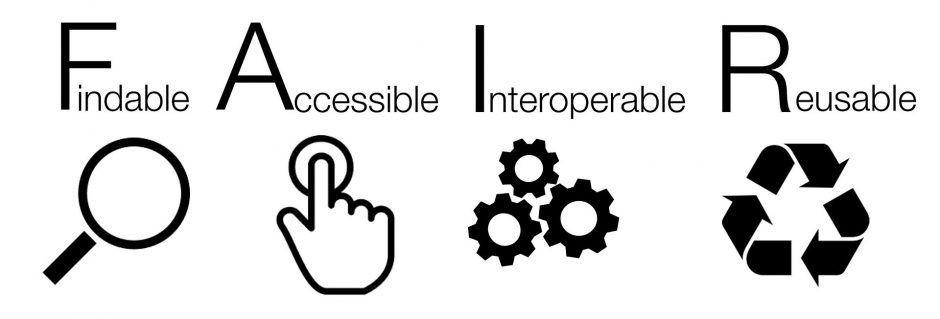FAIR principles in digital scholarly editions
In the context of the cooperation beetween RIDE and the Text+ consortium of the German National Research Data Infrastructure (NFDI), a brief handout for reviewing the FAIR principles in editions has been prepared (for German version see below).

Criteria for reviewing the application of FAIR principles in digital scholarly editions. Version 1.1
Tessa Gengnagel, Frederike Neuber and Daniela Schulz, with contributions by Patrick Sahle, April 2022.
Findable. Can the edition be found via library catalogs, discovery systems, or relevant edition catalogs (e.g., the Catalogue of Digital Editions maintained by Greta Franzini or the catalog by Patrick Sahle)? Can the data be found through disciplinary repositories or general research data repositories (including Zenodo, Dariah Collection Registry, Humanities Commons)? Is a persistent identifier used? How efficient is a search for the edition using a search engine?
Accessible. Is the edition freely accessible for any user, or are there access restrictions? Which parts of the edition are accessible (presentation layer, data layer)? Have global aspects of accessibility been taken into account, e.g. by allowing language selection? What about web accessibility and user friendliness of the edition?
Interoperable. Is the (primary) data recorded in a standardized and widely used format (e.g. according to TEI and its subsets or specific customizations such as the DTABf) which would allow for the integration of the data into larger corpora or the use of specific software solutions? Is the data on which the edition is based accessible via technical interfaces? Does the edition offer special APIs? Does it itself aggregate data via interfaces from other resources (e.g. as part of IIIF)?
Reusable. Is the edition data accessible, and if so, how (individual download, aggregate download, repository, API)? What are the licenses for the edition data? Do they allow any subsequent use at all? Are the data sets and their creation, processing and modeling documented in such a way that third parties can work with them?
Kriterien zur Rezension der Anwendung der FAIR-Prinzipien in digitalen wissenschaftlichen Editionen. Version 1.1
Tessa Gengnagel, Frederike Neuber and Daniela Schulz, unter Mitarbeit von Patrick Sahle, April 2022.
Findable. Ist die Edition über Bibliothekskataloge, Discovery Systeme oder einschlägige Editionskataloge (z.B. den von Greta Franzini gepflegten Catalogue of Digital Editions oder jenen Katalog von Patrick Sahle) auffindbar? Kann man die Daten über Fachrepositorien oder allgemeine Forschungsdatenrepositorien (u. a. Zenodo, Dariah Collection Registry, Humanities Commons) finden? Wird ein persistenter Identifikator verwendet? Wie effizient ist eine Suche nach der Edition mit einer Suchmaschine?
Accessible. Ist die Edition für jede/n Nutzer/in frei zugänglich oder gibt es Zugangsbeschränkungen? Welche Teile der Edition sind zugänglich (Präsentationsschicht, Datenschicht)? Wurden globale Aspekte der Zugänglichkeit beachtet, bspw. durch Möglichkeit der Sprachauswahl? Wie steht um die Web Accessibility und Barrierefreiheit der Edition?
Interoperable. Sind die (Primär-)Daten in einem standardisierten und idealiter verbreitetem Format erfasst (z.B. nach TEI und dessen subsets bzw. spezifischen customizations wie dem DTABf), welches die Integration der Daten in größere Korpora bzw. die Anwendung bestimmter Softwarelösungen erlauben würde? Sind die der Edition zugrundeliegenden Daten über technische Schnittstellen abrufbar? Bietet die Edition spezielle APIs? Aggregiert sie selbst Daten über Schnittstellen anderer Ressourcen (z.B. im Rahmen von IIIF)?
Reusable. Sind die Daten der Edition zugänglich, und wenn ja, wie (Einzeldownload, Gesamtdownload, Repositorium, API)? Unter welchen Lizenzen stehen die Editionsdaten? Ermöglichen diese überhaupt eine Nachnutzung? Sind die Datensätze bzw. ihre Entstehung, Bearbeitung und Modellierung so dokumentiert, dass Dritte damit arbeiten können?
